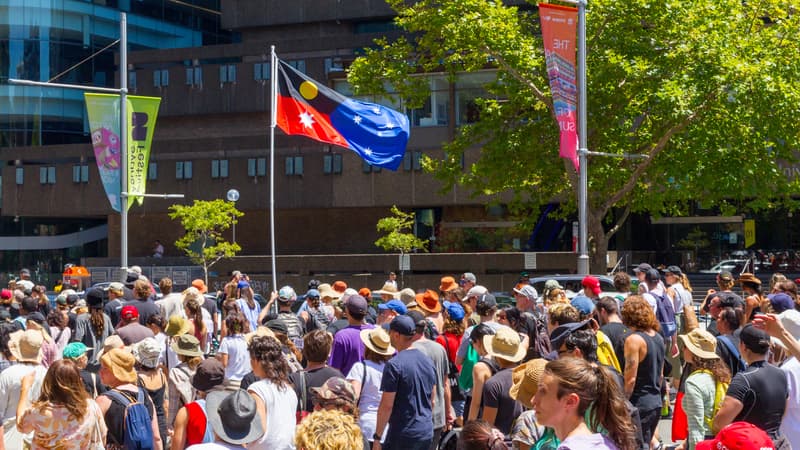Australians celebrated their National Day on Thursday. Finally, “celebrate” is a very big word in view of the growing protest against which this “Australia’s day“is the theme, as pointed out here by the guardian. The expression of “Australia’s day” in itself it may not be adequate: in fact, many demonstrations, bringing together tens of thousands of demonstrators, have taken the opportunity to punish the “invasion day“(“Invasion Day”), the “survival day(“Survival Start Day”) according to banners and speeches.
The critics of January 26 accuse the date of not taking into account the history of the “natives” – a category that includes the aboriginal ethnic groups and the inhabitants of the Torres Strait – or even of being an insult to the memory of the indigenous people. . They campaign for the displacement of the celebration to another niche and for a better political representation of the native populations.
From the “First Fleet” to the “Border Wars”
To better understand the problem, we must return to the fact commemorated in the circumstances. It is about remembering the arrival in Australia of the “first fleet”, on January 26, 1788, that is, the docking in Sydney Cove of eleven English ships that transported a group of passengers called to become the first European inhabitants of the island. .
These expatriates should not have rejoiced at their entry into the bay. Great Britain (the name “United Kingdom” will not see the light until 1801) having decided to establish a prison base in these new lands, far from London, these were common prisoners accompanied by their guards. At the end of their odyssey, the travelers of the “first fleet” were thus locked up in a penal colony.
This European landing also started a long cycle of wars, the “Frontier Wars”, during which colonists carved up territory first left to their ancestors there, pushing them further and further back, until they imposed control over all of Australia. .
A lie”
A sign that this January 26 has always been surrounded by a controversial aura, specifies the guardian, and it has always struggled to arouse the enthusiasm of the crowds, only becoming a party in 1994 after having been marked on the calendar since 1808. Thirty years later, it finds fewer and fewer supporters. Local authorities have even given up formalizing naturalizations on this day.
But it is among the aborigines where the criticism is most vehement. One of them, Lynda June-Coe, who addressed the protesters gathered in Sydney, said, as reported by the British newspaper:
“235 years later, we’re still not farther along. They tried to wipe us off the map, we’re still here. They tried to turn us into ancient history, we’re still here. They tried to commit genocide against us. We’re still here.”
Academic Marcia Langton, herself of Aboriginal descent, told the same source:
“We have to stop lying to each other. And the biggest lie, of course, is the ‘Australia’s day‘. On doit bien être capable of finding a date plus oecumenique and I think that we can begin to tell the truth about the history of Australia, and to manifest a little respect to the égard of all the survivors of the wars of border”.
Change date? The idea gains ground
However, so far no alternative date has been imposed and, at this point, the local executive does not plan to change it either. This does not prevent the idea from gaining ground among the general population. According to this annual survey, 26% of Australians said they favor a new time for their national holiday in 2023, up from 20% in 2022 and 15% in 2019.
If its diffusion is fast, this opinion is, therefore, still a minority. The explanation is partly due to demographics, the natives as a whole represent only 900,000 people of the 25 million Australians, according to these figures exposed by West of France.
Find your “Voice”
The debate surrounding the national holiday is not the only controversy about the weight of Australia’s history and the status of indigenous peoples. The reflection on the representation of the latter deeply affects Australian society and the political class. As indicated in Launching here, the Australian government has announced the organization of a referendum next November on the introduction of an “Indigenous Voice” in Parliament.
The concept, detailed here by the RTBF website, is as follows: it would be an advisory body – meaning its recommendations would not be binding on elected officials and therefore would have no laws – made up of 24 people, extracted from the different aboriginal peoples and the inhabitants of the Torres Strait. It would be up to them to advise or speak on policies affecting Aboriginal people.
“We want real power”
The proposal hardly has more consensus than that of January 26. Many actors or observers consider it insufficient in view of the grievances suffered and the social neglect that the aborigines still experience. Lidia Thorpe, an environmental senator and Aboriginal herself, sent the guardian:
“Do we want to become advisors now? We deserve better. (…) Our constitution comes from the soil and blood of our people. We want peace. We deserve better than a consultative body.”
“We want real power and we won’t settle for less,” he added.
Source: BFM TV


